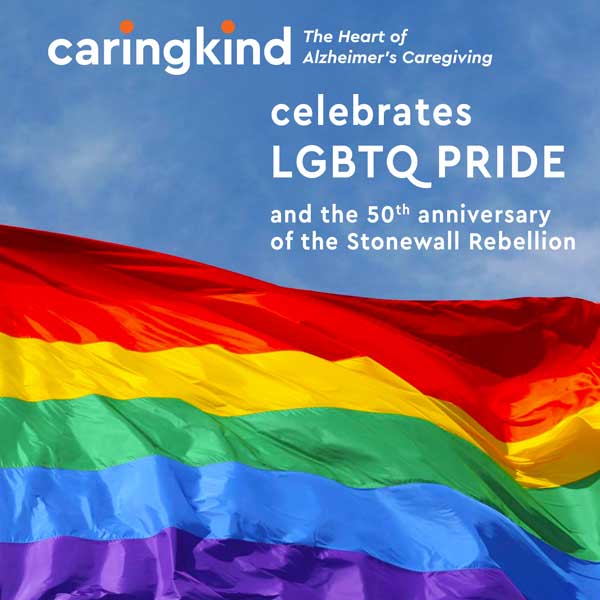By Jed A. Levine, adapted from material
by Teresa Theophano, Assistant Director of Care Management Services, SAGE

In June we celebrated Pride Month and the 50th Anniversary of Stonewall, the start of the modern Gay Liberation Movement. Over the past 50 years we’ve learned a lot about the special concerns of the estimated three million LGBT caregivers in the U.S. caring for a person with dementia. And, we know these challenges remain year-round.
LGBT caregivers often face unique challenges when caring for a person with Alzheimer’s or dementia. It is important that we understand these issues and provide customized care for the LGBT caregiver. For example, LGBT caregivers are more likely to experience isolation than their straight counterparts. To combat this feeling of isolation and loneliness, LGBT caregivers can learn more about joining support groups that address issues related to the LGBT community. Over 25 years ago CaringKind partnered with SAGE, (Services and Advocacy for LGBT Elders) to create LGBT support groups which have been a lifeline for many.
A member of the dementia caregivers support group since its inception, one member has often told the other members that being in the group has made her feel more compassionate, and that it also contributes to her patience in caring for her mother. She was quoted saying, “We all speak the same language.”
While many LGBT caregivers are providing “horizontal caregiving”—in which they care for another LGBT adult, such as a partner, spouse, friend, ex-partner, or neighbor—we also see many adult children caring for their parents with dementia or other conditions. It’s not unusual for an LGBT adult among a group of siblings to act as a primary caregiver. It’s also possible that LGBT adults become caregivers for their parents or other relatives at a higher rate than non-LGBT people. Families may presume that LGBT adults have more time and availability because they’re less likely to have children. Additionally, LGBT people’s families of origin may not be aware of their relationships or obligations. Care for members of their families of choice may go unnoticed. Adult LGBT children may also find themselves caring for parents who have not been supportive of their LGBT identity.
Many LGBT people rely on those families of choice rather than biological ones for their care, and LGBT caregivers may not be treated with the same respect or understanding. They can be especially vulnerable to caregiver burden, stress, and burnout, and less likely to seek out supportive services because of fears of being treated poorly. More apt than non-LGBT adults to care for each other in isolation, LGBT caregivers can face further strain because there is no one else involved to share the care. Solo caregivers are particularly vulnerable, with compounded health disparities and few opportunities for respite.
Culturally competent support is essential for LGBT caregivers. To find gay-friendly resources, please call the CaringKind Helpline at 646-744-2900. Personalized support is only one phone call away. You are not alone. CaringKind and SAGE are here for you!
